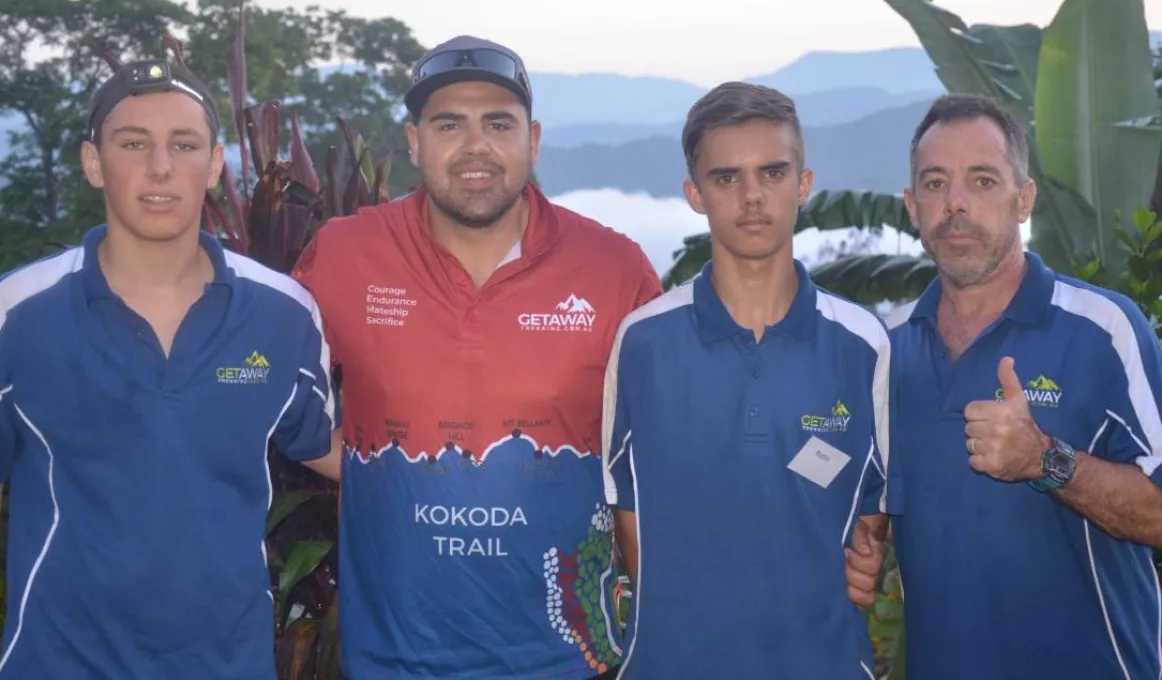Remembering and Reconciling on Kokoda - Remembrance Day 2017

This year, a group of South Australian Aboriginal and non-Aboriginal students and their leaders walked the Kokoda Trail in commemoration of the 75th anniversary of the battle.
It is 75 years since Australian soldiers, outnumbered and in great peril, slowed the Japanese advance along the now famous 96-kilometre Kokoda Trail in Papua New Guinea.
Between July and November 1942, they battled Japanese soldiers along a muddy and rocky track over mountain terrain, through thick forest and across fast-flowing streams. Supporting each other, including many wounded, their gallantry helped to defend the strategically important town of Port Moresby. In the process they created a legend, and developed a camaraderie that few of us will ever understand.
This year, to commemorate the anniversary of the battle and remember those who gave their lives on the trail, Wayne Miller (mentor), Grant Halbert (teacher), Robyn Saunders (student) and Beau Halbert (student) from Ceduna spent 8 days walking the track. They were part of a group of year 10 and 11 Aboriginal and non-Aboriginal students and their leaders from South Australia.
Organised by Reconciliation SA, the Kokoda Track Reconciliation Trek 2017 gave students a glimpse of the experience from 75 years earlier, particularly as they researched then recounted the stories of Aboriginal and Torres Strait Islander servicemen.
CEO of Ceduna Aboriginal Corporation Wayne Miller said it was one of the best experiences of his life.
‘The most overwhelming feeling for me was honour,’ Wayne said.
‘While the word ‘honour’ is frequently used, the full impact of the word is not realised until you get to see what the diggers experienced – and for them to succeed in that environment is incredible.’
Wayne said the change in the students as they walked the track was obvious for all to see.
‘As we progressed through the track, the students built a strong bond and sense of mateship,’ Wayne said.
‘In the first few days, everyone was thinking about themselves, worrying about what they were doing as individuals. By the end of the track, they were thinking about the people around them – picking people up when they fell down, caring about the person next to them.’
As well as researching and recounting stories from the track in 1942, each of the students kept a diary and wrote about their own experience. Each had highlights and points of difficulty but all on the track bonded and recognised the sacredness of what in 2017 is an incredibly beautiful part of the world.
‘The Dawn Service at Ishurava was a very emotional experience,’ Wayne said.
‘Being able to honour those that fell on one of the most significant battlegrounds really hit home. It will be one of my most treasured memories.’
Remembering Aboriginal soldiers on the Kokoda trail
Two Aboriginal men who fought along the track were Frank and Ronald Archibald, Gumbaynggirr men, born in Walcha, New South Wales. After first serving in the Middle East, Greece and Crete, Frank and his brother Ronald were sent to Papua New Guinea.
‘They fought in some of the worst conditions along the Kokoda Track. Ronald became ill with malaria and was evacuated to hospital, while Frank was sent to the Siege of Buna.’ (Australian War Memorial)
Tragically, a sniper’s bullet killed Frank on 24 November 1942, as he tried to save a mate who ultimately survived the action.
Find out more
Read more about the Reconciliation Trek at the West Coast Sentinel and more about the Kokoda Trail at the Australian War Memorial.
‘In 2017, 11 November marks the 99th anniversary of the Armistice which ended the First World War (1914–18). Each year on this day Australians observe one minute’s silence at 11 am, in memory of those who died or suffered in all wars and armed conflicts.’ Australian War Memorial
The Department of the Prime Minister and Cabinet provided funding to assist Wayne Miller participate as a mentor for the Kokoda Track Reconciliation Trek 2017.